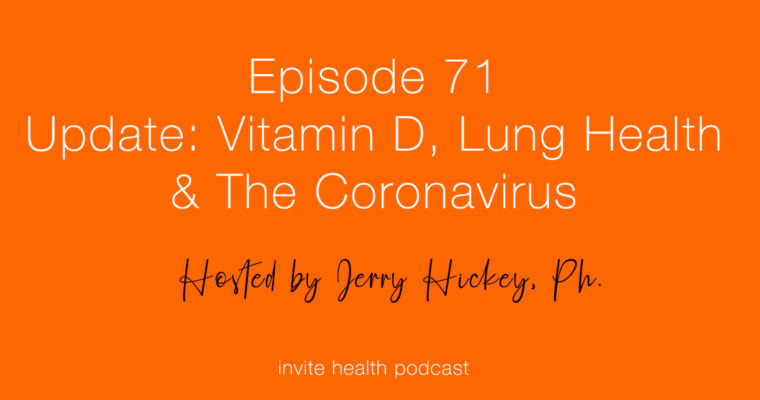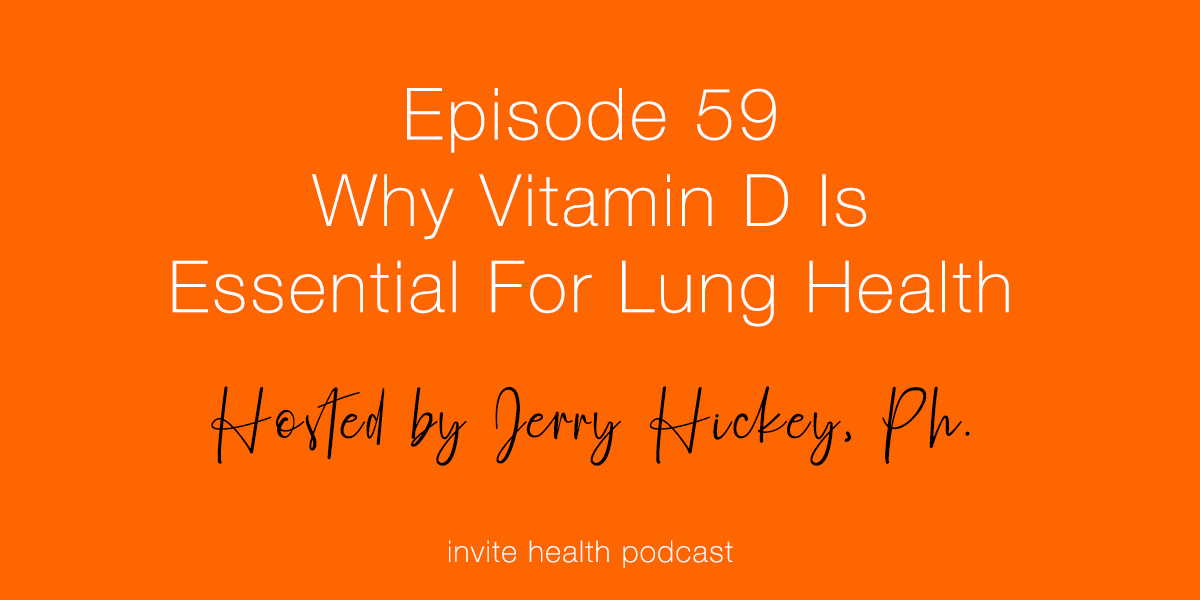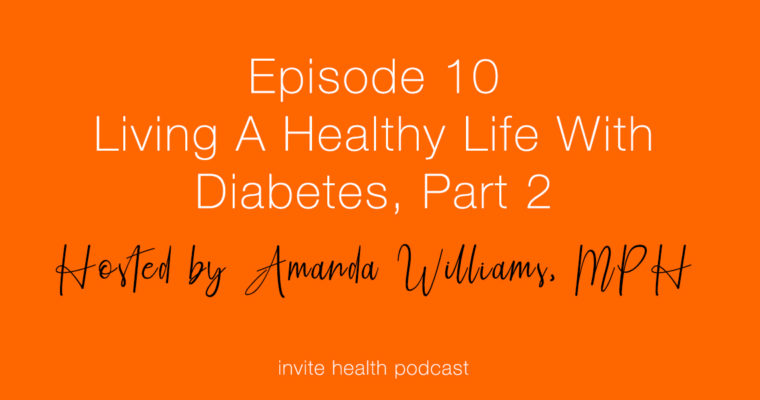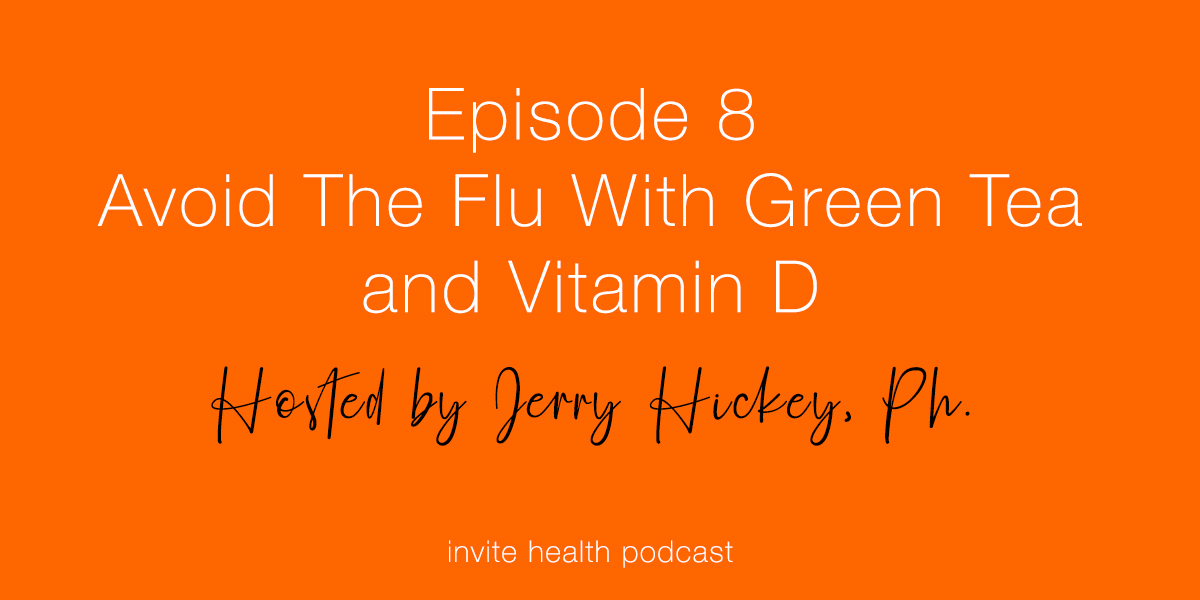Invite Health Podcast, Hosted by Jerry Hickey, Ph.
Subscribe Today!
Drink green tea and swallow Vitamin D and you have a better chance of not getting a cold or flu infection this winter. Today, I am going to discuss how to improve the odds of not getting sick this winter and what you can do nutritionally for your immune system. Let’s get started.
What Happens When You Get The Flu
When someone has the flu and they sneeze, that sneeze can travel at a 100 miles an hour for ten feet; try and duck this in a packed train or room. Coughs travel at 50 miles an hour for about 5 feet; lots of luck ducking that one also. When the virus hits you, it uses enzymes to latch onto your cells, enter them, and then multiply leading to that typical week-long infection. The enzymes are viral and allow the infection to attach to the mucus membranes in your nose, mouth, and the tear ducts of the eyes. The virus is then able to enter and exit your cells; this is how the flu infects you.
The virus also uses polymerase acidic proteins to increase in number. Drugs have been developed to block these viral enzymes, including Relenza and Tamiflu in the 1990s and Xofluza in 2018.
Flu viruses are developing resistance to the earlier drugs but, interestingly, not to the ingredients in Green Tea which can help protect you by inhibiting all three families of viral enzymes.†
Studies on Green Tea and Immunity
Many different studies show that green tea weakens the flu virus by inhibiting the enzymes the virus uses to infect us. Additionally, according to a study from the University of Florida at Gainesville, Green tea also stimulates a particular type of immune cell called a gamma-delta T cell which helps govern the ability of your immune system to fight viruses. The research shows that Green Tea also stimulates the release of interferon-gamma, further helping contain viruses.†
The flu shot stimulates the production of antibodies specific to the flu which help kill it, while green tea weakens it directly, so this is a good combination for many.†
Key Studies
Results of a study published in the Journal of Nutrition from the University of Shizouka School of Pharmacy showed drinking Green Tea six times a week decreased a diagnosis of the flu by a pediatrician by 40%. Drinking Green Tea multiple times a day cut the risk by 46%.
In a separate study of healthcare professionals by the same pharmacy school, taking a green tea capsule along with it’s component L-Theanine lowered the risk of the flu by 75%.
Research from the University of Florida shows that taking a concentrated Green Tea capsule two times daily throughout the flu season strongly cut the incidence of the flu. However, if a person did get sick, the infection was much milder, and lasted for a much shorter amount of days.
Green Tea has even been shown to protect the elderly. Elderly people have a weaker immune system and the classic flu shot works less effectively in them. In a study of 124 elderly residents of a nursing home – all of whom received a flu shot – gargling with green tea cut the risk of developing the flu versus placebo.
Other Nutrients for Protection
Green Tea isn’t the only source of protection from the flu; Vitamin D can help also if you are initially low on it.
Vitamin D blood levels drop over the fall and winter months and a study from the University of Colorado that included 19,000 adults and children shows that having a low level of Vitamin D increases your risk of developing the flu by 40%. It was much worse for subjects with respiratory diseases such as asthma; these people had 5 times a higher risk of catching the flu.†
For a healthy immune system, you should aim at getting your blood level of Vitamin D over 35.
Other nutritional aids to help curb winter time infections include;
- Probiotics
- Nucleotides
- Getting enough zinc and iron; immune cells will use these to kill viruses and bacteria
- Vitamin A or it’s precursor Beta-Carotene
- Also consuming enough protein is helpful
Thank you for tuning in to the Invite Health Podcast. You can find all of our episodes for free wherever you listen to podcasts or by visiting www.invitehealth.com/podcast. Make sure you subscribe and leave us a review! Follow us on Facebook, Twitter and Instagram at Invite Health today. We’ll see you next time on another episode of the Invite Health Podcast.








